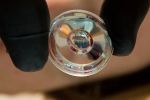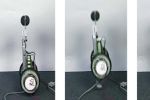Organ Donors Should Mention It
Those wishing to donate organs after their death should communicate their wishes to family members and register their decision on the Australian Organ Donor Register to ensure their organ donation wishes are fulfilled, according to new Queensland University of Technology (QUT) research.
PhD student Melissa Hyde has conducted the research, which was sparked by an interest in the psychology behind people's decisions to donate their organs upon death.
"Australia has one of the lowest organ donation rates in the world and one of the major factors that has come up in previous research is that people have not provided their family with information about their consent for donation," she said.
Ms Hyde said it was important for people to provide consent for donation by recording their signed consent on the Australian Organ Donor Register and telling family about donation wishes.
"If families are not aware of the wishes of their loved ones, it means that when people in the medical profession ask them, they may say they do not want the organs donated," she said.
"It may be up to 50 per cent of family members who refuse to consent to donation, and this most often happens because they aren't aware that their loved one wanted to donate.
"It has a lot to do with the timing as well - family members are grieving and may not want to think about making a decision about organ donation and it does make it easier and less stressful for them if they know what their family member wanted.
"By getting people to discuss their donation wishes, it may make talking about organ donation and mortality more accepted in society - this is a decision which may save lives."
Ms Hyde said the issues about communicating wishes to family could include difficulties with starting a conversation about organ donation, feeling unmotivated to do so, religious beliefs, thinking family won't support the decision, or feeling uncomfortable in general talking about death.
"From the research I conducted, the people most likely to fill out a registration form or talk to their family are those who believe that communicating their decision is the morally right thing to do," she said.
"These people also consider being an organ donor as an important part of their identity and how they view themselves and think that communicating their decision is a positive thing to do and relatively easy to perform.
"My research also showed that the people who are most likely to talk with family about their decision are those who are more certain they want to be organ donors, and think that family members will be open to talking about organ donation.
"They are also likely to make the most of opportunities to talk to their family about donation such as when organ donation is discussed on a TV show or they see a story about a transplant recipient in the newspaper."
Ms Hyde said many people were unaware that if they registered their intent to donate on the donor register prior to July 2005, they need to re-register their consent by signing a new registration form.
She said it was hard to say how much of a difference an increase in consent for donation would have on rates of organ donation in this country, but it was likely to have a significant effect.
"There are a range of reasons Australia has one of the lowest rates of donation - it could be because fewer people die in a way that allows donation, or due to the policies and processes of Australia's organ donation and transplantation system, or a result of our ageing population and rising demand for organs - but certainly, the issue of consent is a big one and would make a difference in those numbers," she said.
"I would just encourage people to register their consent and communicate their donation wishes to their families; it is so important that they do both of these things."
Ms Hyde has recently been awarded a QUT Vice Chancellor's Postdoctoral Research Fellowship to continue her study in the area and said she hopes to design an intervention to increase communication about this issue among families.
Story from ScienceAlert.com.au
1 Comment
Popular Tags
SciTech
Regular Features
Popular on Popsci
Most Viewed
Most Commented
SciTech
- Sorry Ladies, Those Shots Aren't Sexy
- The Agony of the Heat
- Does Your Taste in Music Reflect Your Intelligence?
- Can People Safely Eat Cat Food?
- Drinking Adds to Cancer Risk
- Sound Becomes Light
- Organ Donors Should Mention It
- Heat Finds Fingerprints Quickly
- Audience Gender Sways Choice
- How to Hit Better Returns in Tennis
Most Emailed
SciTech
- Power From The People
- Who Protects The Internet?
- 3-D Gaming: Real, or Really Lame?
- Flight School
- Sex, Hygiene, and Gardening
- Diet May Explain Cancer Rates
- Internet Explorer 8 Released by Microsoft
- Mercury In-Line Skates Let You Glide On a Shock-Absorbed Cushion Of Air
- The Science Behind Unseen Phenomena
- She Wore Green Setae









Comments
Isn't this a question they ask you when you get a driver's license or ID card these days? In NSW anyway, the front of the card says 'Organ Donor - A' and I'm assuming 'A' means all as I ticked the all box on my application.
If this isn't the case across Australia, it would be a really easy way to solve this issue, make it a question on license tests!
That way, if someone dies, they can just ask the RTA what they person had selected on their card and comply with the wishes that way.
0 out of 0 people found this comment helpful